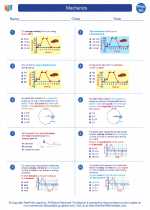Gas
Definition: A gas is one of the four fundamental states of matter (the others being solid, liquid, and plasma). It is characterized by its low density and ability to expand to fill the shape of its container.
Properties of Gases:
- Compressibility: Gases can be easily compressed because of the large empty spaces between gas particles.
- Expansion: Gases expand to fill the volume of their container, taking its shape.
- Diffusion: Gases mix evenly and completely with each other due to the constant, random motion of gas particles.
- Pressure: Gas exerts pressure on the walls of its container due to the constant collisions of gas particles with the walls.
- Temperature: The temperature of a gas is directly proportional to the average kinetic energy of its particles.
Gas Laws:
- Boyle's Law: States that at constant temperature, the volume of a given mass of gas is inversely proportional to its pressure.
- Charles's Law: States that at constant pressure, the volume of a given mass of gas is directly proportional to its absolute temperature.
- Gay-Lussac's Law: States that the pressure of a given mass of gas is directly proportional to its absolute temperature, provided that the volume remains constant.
- Combined Gas Law: Combines Boyle's, Charles's, and Gay-Lussac's laws into a single expression to describe the relationship between pressure, volume, and temperature of a gas.
Kinetic Theory of Gases:
The kinetic theory of gases explains the behavior of gases in terms of the motion of their particles. It makes the following assumptions:
- Gases are made up of tiny particles (atoms or molecules) that are in constant, random motion.
- The gas particles are so small compared to the distances between them that the volume of the individual particles can be assumed to be negligible.
- The gas particles undergo perfectly elastic collisions with each other and with the walls of the container, meaning that no kinetic energy is lost during collisions.
- The average kinetic energy of the gas particles is directly proportional to the absolute temperature of the gas.
Study Guide:
To study the topic of gas effectively, consider the following steps:
- Understand the fundamental properties of gases, including compressibility, expansion, diffusion, pressure, and temperature.
- Learn and apply the gas laws, including Boyle's Law, Charles's Law, Gay-Lussac's Law, and the Combined Gas Law, in various problem-solving scenarios.
- Grasp the concepts of the kinetic theory of gases and how it explains the macroscopic behavior of gases based on the motion of their particles.
- Practice solving numerical problems related to gas properties, gas laws, and the kinetic theory of gases to reinforce your understanding.
[Gas] Related Worksheets and Study Guides:
.◂Physics Worksheets and Study Guides High School. Mechanics
The resources above cover the following skills:
Core Ideas for Knowing Science
Physical Science
Changing the movement of an object requires a net force to be acting on it.



